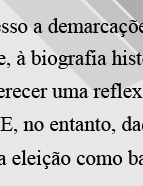

................................
On the other hand, variations on the voluntarist theory and the contrasting assumption of the prevalence of the environment over the individual multiplied at the pace of biographical production. It should be noted that this circumstance is first and foremost empirical. Until a few years ago, and with very localised exceptions, Portuguese historiography did not promote a true substantial reflection on the representativeness of the biographical object or on the limits or freedom of human action. Only the final decades of the nineteenth century (and later, by ideological extension, the period of the Estado Novo), under the influence of sometimes positivist theories and sometimes those, not necessarily contradictory, advocated by authors such as Thomas Carlyle and Ralph Waldo Emerson, saw more consistent attempts to develop an explanatory theory of individual intervention in history. Even then, despite the texts – some of which have become references – by Alexandre Herculano, Pinheiro Chagas, José Silvestre Ribeiro, Silva Graça, Oliveira Martins, and above all, Teófilo Braga, it is difficult to make out any theoretical clarity or argumentative depth in the vast majority of the biographical exercises of the time to sustain them in a presumed debate on human agency. This means that in practice, and throughout the period under analysis, eclecticism was a constant feature of the genre, with the portrayed figure appearing more or less conditioned by surrounding circumstances and more or less capable of intervening in the "social milieu."
In schematic terms, if it were possible to impose a secure order on a genre characterised by diverse historical conceptions, essentially syncretic approaches, and an overly heterogeneous set of objects, one might say that biographical writing in Portugal developed all possible combinations of elements, in the distance between the following (ideal) poles, giving rise to as many models or modes of biographical writing: (1) the tendentially exclusivist consideration of the role of the (great) individual as the driver of historical action with the former emphasising the weight of the context in their conditioning; (2) the use of biography as a source of exempla for present and future generations – in the tradition of Historia Magistra Vitae – diametrically opposed to the more erudite, ideally neutral, portrait of life, typically produced in an academic environment, and whose purpose and end are tied to research; (3) the purely academic product, for self-consumption, as opposed to works published with the intention of popularisation, generally closer to the literary register; and finally, (4) specifically academic and amateurish authorship, often driven by curiosity about historical themes.
